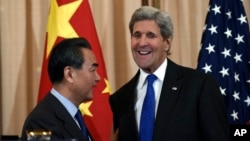Top diplomats of the U.S. and China said Tuesday that they had made "significant progress” and were hopeful of reaching an agreement “in the near future” on a new U.N. Security Council resolution for tougher measures against North Korea after its recent nuclear and missile tests.
U.S. Secretary of State John Kerry met with Chinese Foreign Minister Wang Yi at the State Department, their third meeting in the last month.
"We have made significant progress. It has been very constructive in the last days, and there is no question that if the resolution is approved, it will go beyond anything that we have previously passed," Kerry said in response to a question by a VOA reporter.
Kerry added that the draft was “in the appropriate evaluative stage.” He did not elaborate on the specific language in the new Security Council resolution.
“We are looking at the possibility of reaching agreement on the draft resolution and passing it in the near future,” Wang said, adding that the two countries shared the goal of bringing North Korea back to the negotiating table.
Six-party talks
Launched in 2003, the so-called six-party talks are aimed at ending North Korea's nuclear program through negotiations involving China, the United States, North and South Korea, Japan and Russia.
The talks have been stalled for years after multiple nuclear tests by the North Koreans. Pyongyang is already under strict U.N. sanctions that limit its imports and exports and measures that ban top leaders from traveling.
Wang said China has put forward a proposal that will pursue “in parallel tracks the denuclearization of the Korean Peninsula and the replacement of the Korean armistice with a peace agreement.”
The 1950-53 Korean War ended with an armistice rather than a peace treaty.
Kerry expressed openness to an eventual peace agreement to bring the Korean War to a conclusion.
“What we need is for the DPRK to understand that it can rejoin the community of nations, it can actually ultimately have a peace agreement with the United States of America that resolves the unresolved issues of the Korean Peninsula, if it will come to the table and negotiate the denuclearization,” he said.
Pyongyang’s nuclear test on January 6 and missile test on February 7 drew international condemnation.
China has criticized North Korea’s nuclear and missile tests but has been reluctant to back tougher punitive measures, fearing they could lead to the collapse of Pyongyang’s regime and a flood of refugees across the border.




